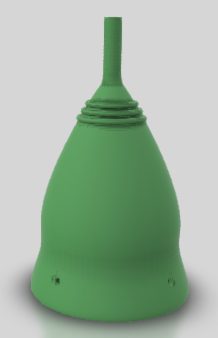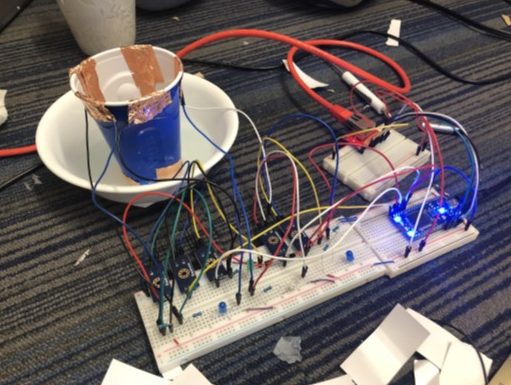A diverse team of hackathoners has come together to innovate in the risk-averse world of medical device development. Georgia Tech students Alex and Girish (computer science majors), Rhea (computer engineering major), and Netra (biomedical engineering major) make up the SmartCup team that participated in the HealthTech hackathon in March 2021.

The SmartCup team wanted to create a product that benefited women’s health and could contribute to improvements in the field. In classic hackathon fashion, coffee, snacks, and a can-do attitude helped the team muscle through a high-intensity weekend of ideation. Drawing on their multidisciplinary background, the team came together to design and engineer a Bluetooth-connected menstrual cup designed for people with heavy menstrual cycles, specifically those diagnosed with polycystic ovary syndrome (PCOS).
Marty Jacobson, a biomedical engineering professor at Georgia Tech, helped guide the team through the competition, encouraging them to put their heads together and work toward a functioning product. Named one of the top Georgia Tech professors in the Student Recognition of Excellence in Teaching: Class of 1934 Award for 2020, Jacobson knows a thing or two about creating opportunities for students to advance their skills. By incorporating Autodesk® Fusion 360® technology into the project equation, Jacobson encouraged the SmartCup team members to think beyond what they’d been taught in the classroom and transform their theory into creative application.
“I teach biomedical engineering students. They must be able to design solutions that include complex biological, chemical, electronic, computational, and human factors considerations. Instead of trying to prepare them for everything, we have to prepare them for anything. And in the medical device development field, there is still a huge need for innovation,” says Jacobson.
The hackathon: process and product development

While the SmartCup design is similar to other menstrual cups sold commercially, the addition of smart technology brings this idea one step further, aiming to make life easier for women with heavy periods. But electronics, external batteries, or ethernet cables being placed inside a body? That’s a tricky concept to sell to pretty much anyone (besides your neighborhood robot). No, the SmartCup team was looking to design something much more elegant and seamless. With Radio Frequency Identification (RFID) technology, the team created a dishwasher-safe, molded plastic menstrual cup that was able to send signals to servers through radio frequencies.
SmartCup contains five small copper plates around the inner circumference of the cup, with another plate at the very bottom. Since menstrual blood contains electrolytes, it serves as a good conductor of electricity. When the blood level in the cup reaches the upper copper plates, volt meters detect the voltage difference. At this point, the device ID is sent to a server that figures out the phone number of the user based on their cup’s ID. And voila! The user gets a friendly reminder about the status of their cup.
With Fusion 360, the students were able to visualize their imagined worlds and use features like animation to make their ideas come to life. They knew they might not be able to create something that looked perfect, but who could in the span of one frenzied hackathon weekend?
Benefits of industry convergence on product development
A major contributor to the team’s success was the variety in disciplines and backgrounds of its members, which set the stage for creativity and a spirit of collaboration. Jacobson sums it up well. “As part of multidisciplinary teams, engineers and manufacturers in the 2020’s must be able to work with the same agility that would have been expected of software development teams in the past.” This means stepping outside of your usual frame of reference to consider how someone from another discipline perceives things. It also means learning the science of discernment and the art of surrender— when should I step in and advocate for my body of knowledge, and when should I step back and make space for another’s? In the end, the SmartCup team members gained technical and interpersonal skills that will set them apart from the rest of their peers.
As Netra puts it, “When I first came to GA tech, my initial thought was that I was going to be an engineering major through and through. I wasn’t going to deal with any CS—which was kind of naïve. Going through this project, I’m learning how important it is to get a taste of everything that you can learn in tech and from others. Communication and connections are some of the most important things you can get from college. Getting those skills has made me a lot better as an engineer.”
When an interdisciplinary team comes together to work toward a common goal, the whole becomes greater than the sum of its parts. The SmartCup team is demonstrating that, beyond innovation in women’s health, converging industries and disciplines create opportunities for ideas previously unimaginable. And, ultimately, the team is proving that when you make space for difference, great things can happen.